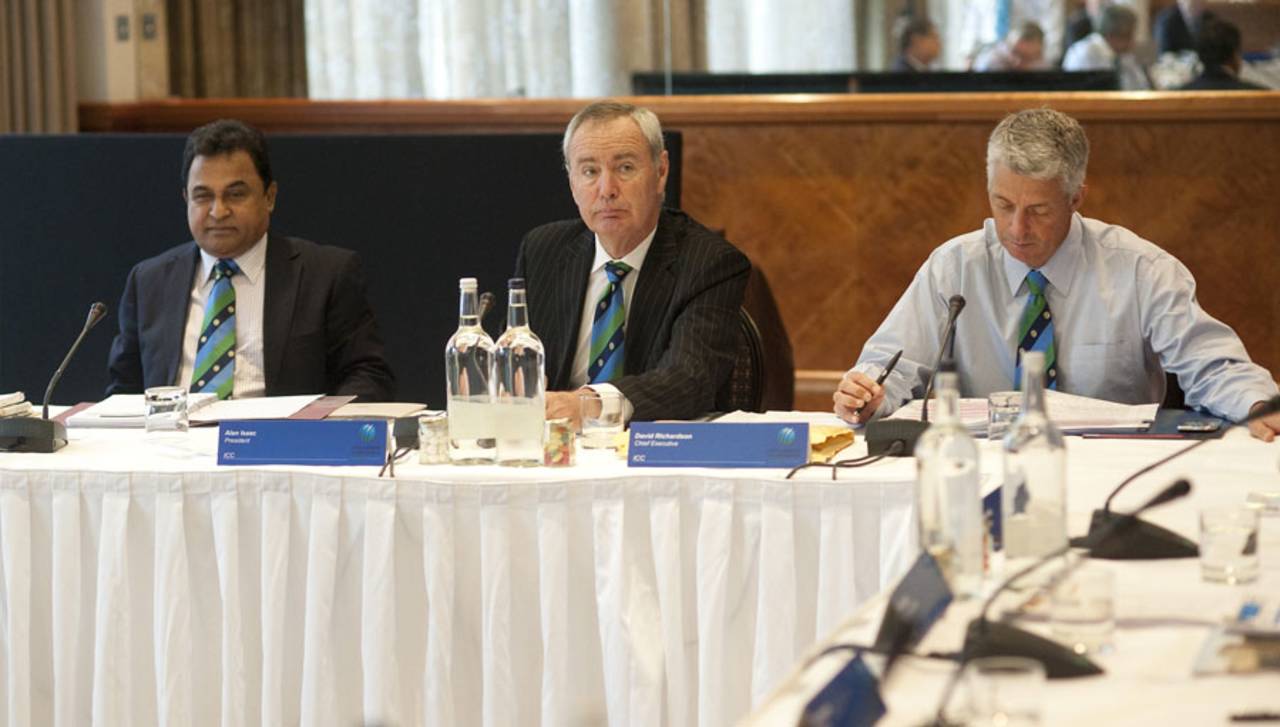What happened at the ICC meeting?
Participants of the ICC executive board meeting have two contrasting views of the proceedings on the first day, thus rendering slightly disingenous the ICC's press release that stated that there had been "unanimous support" for the matters at hand
Sharda Ugra and Nagraj Gollapudi
29-Jan-2014

File photo: The ICC's Mustafa Kamal, Alan Isaac and Dave Richardson were among those present at meeting • Getty Images
Participants of the ICC executive board meeting have two contrasting views of the proceedings on the first day, thus rendering slightly disingenous the ICC's press release that stated that there had been "unanimous support" for the matters at hand in Dubai for the better part of Tuesday.
These accounts came from what are clearly now opposite sides of the fence with regards to the proposals on the revamp of the ICC.
On one side are the three cricket boards that are architects of the position paper, which seeks to restructure the ICC's administration and hand over greater executive power and financial advantages to these three, the most powerful cricket boards in the world: the BCCI, Cricket Australia and the ECB.
On the other side is the group of protestors who stood up to be identified between Tuesday night and Wednesday morning: the cricket boards of Bangladesh, Pakistan, South Africa and Sri Lanka.
The difference between two accounts was so pronounced that they could have come from observations being made of events held in two different rooms and involving two different sets of people.
The meeting was held among the heads of the 10 Full Member boards, three Associate representatives (from Bermuda, Scotland, Singapore) and the ICC president Alan Isaac, vice-president Mustafa Kamal and CEO Dave Richardson. The members were not formally presented with the slightly amended "resolutions" that had been compressed from over 50 proposals into five specific categories by the Big Three, but had the principles behind the changes read out to them.
These are two varied versions of the same event, presented to ESPNcricinfo staff, in the order in which they were made to us:
Version one
"Those who raised concerns at the outset of the meeting, did not object to any of the principles discussed. ICC president Alan Issac asked everybody: Do you all support the principles? Not one dissenting voice was raised. Many of the boards have already signed the fiver-resolutions, enough to carry the day. It is not that four have prevented or block anything. Actually they all supported it. All members were asked three times and not one member objected. The decision draft had been postponed because it was in need of fine tuning to be done with respect to the bilateral tours, which formed an important segment in the discussions the Big Three had with the rest of the countries."Another member broke down the opposition's main concerns.
- The BCB's was around losing Test status. "They did not understand completely. It was never proposed that they lose their Full Member status. When the point about relegation was removed, the BCB was fine."
- The PCB's concerns centered around the FTP and bilateral series, and BCCI's offer of a "neutral venue" may be a positive sign.
- CSA and SLC wanted more time: "They agreed in principle but wanted to discuss more when the board reconvenes next month."
Version two
"We were harangued at the meeting and it has only deepened divisions and polarised the whole issue. Some statements were made against various boards and some responses were received. The term "unanimous support" is a misleading one… it's attempt to mislead the world public. We haven't agreed to the terms that were offered. Yes, they offered amended terms but we only said we would discuss it - no one had signed any terms, and that is our position. There is nothing more to it. Unless the smaller boards don't take a stand world cricket as we knew it is over."Another member said that there had been broad support given out on certain issues but "no resolutions had been signed and there was no vote. The atmosphere was quite heated, everyone was pretty much into it. It was both hot and cold. We were not given any documentation but had things read out to us. They are trying to call on the next meeting quickly, maybe inside a few weeks. No more meetings tonight. It will get calmer. It is a big thing that we managed to have the resolution to not go through."
Pick your truth. Other than "unanimous support".